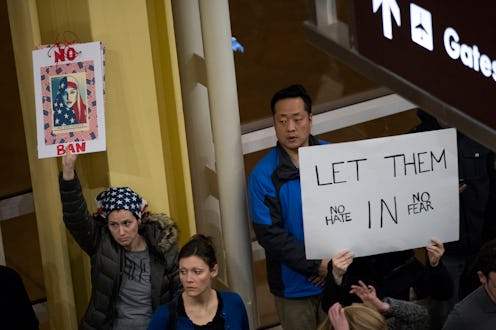News
Brace Yourself For A Travel Ban Even Worse Than The Last

On Monday, the Supreme Court ruled that portions of President Trump's executive order travel ban targeting six Muslim-majority nations can proceed as the case awaits a full ruling. On Thursday night, it will start to go into effect — and legal experts says they are ready for another round of chaos, even worse, perhaps, than when the initial ban was signed in January.
On Thursday night, travelers from Iran, Syria, Yemen, Somalia, Sudan, and Libya will be blocked from entering the United States, unless they have, in the words of the court, a "bona fide" relationship with an American individual or entity. Legal experts were puzzled by that language. However, the Supreme Court noted that as long as the relationship was not created specifically for the purpose of evading the ban, those immigrants could be let in.
On Wednesday night, though, hours before the policy goes into effect, the State Department released its guidance on who the ban does and does not apply to. According to the State Department cable obtained by Reuters, "'Close family' does not include grandparents, grandchildren, aunts, uncles, nieces, nephews, cousins, brothers-laws and sisters-in-law, fiancés, and any other 'extended' family members."
At a press briefing on Thursday, the transcript of which was shared with Bustle via an emailed press release, a State Department official stated that: "The fact that a resettlement agency in the United States has provided a formal assurance for refugees seeking admission is not sufficient, in and of itself, to establish a bona fide relationship under the ruling."
According to some of the legal advocates who have been fighting the case so far, it looks like things are about to get even crazier.
"We are shocked," Nicolas Espiritu, a staff attorney for the National Immigration Law Center, who represent the plaintiffs in the case before the Supreme Court, tells Bustle. "The relationship between refugee resettlement agencies and their clients is bona fide and normal. This definitely clarified that federal government hasn’t heeded instructions from Supreme Court."
Though he wouldn't confirm any plans, Espiritu said that the NILC is "exploring all of our options" and wouldn't rule out entering into further litigation to ensure that the Supreme Court's decision is followed properly by the government.
This feeling of confusion from the federal government is echoed by other immigration advocates. Melanie Nezer, senior vice president for the Hebrew Immigrant Aid Society, a refugee resettlement organization, spoke with Bustle on Thursday, after she had waited for hours to receive a direct guidance for groups like HIAS (which is itself a plaintiff in the case) from the government. However, beyond the briefing for reporters, she only got silence, even with mere hours left before the policy goes into effect.
Nezer says that the guidance from the government requiring refugees to prove documentation of a close personal family connection is onerous and difficult for people in the kind of situation most refugees must be in to seek refugee status in the first place.
"I know if I had to find my sister's birth certificate and I was supposed to get on a plane tomorrow, I'd be in a panic, and my sister lives in Seattle, and I live here," Nezer tells Bustle. "We need direction on what we're going to be expected to do... How do we demonstrate that, what's going to be required?"
According to Stephen H. Legomsky of Washington University Law, who specializes in immigration law, if litigation comes as a result of confusion from the ban's implementation, there could even be potentially a strong case arguing the State Department would be in contempt of court.
"The federal district court's injunction remains in force for anyone who has a bona fide relationship," Legomsky says. "By the terms of the Supreme Court order, a resettlement agency is a bona fide relationship. Therefore, the State Department is in contempt of that order."
Legomsky also adds a more personal note: "As grandparents, my wife and I were surprised to learn that our grandchildren are not close family members. There is no doubt that this and other family exclusions will be challenged in court."